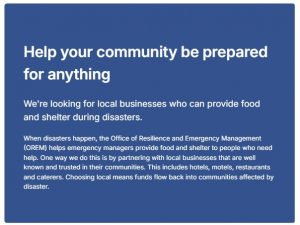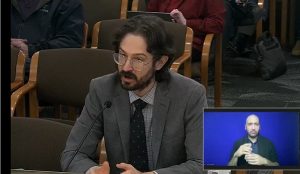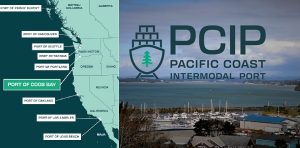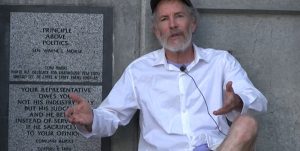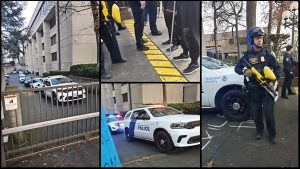Experts recommend modernizing water law in 6 areas
17 min read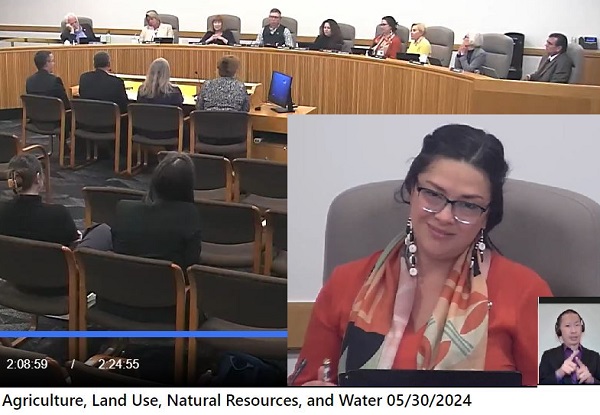
In the 2025 session, Oregon hopes to adapt its water law to drought and climate change. The governor’s office reached out to four experts in water law. With Senate and House committees May 30:
Geoff Huntington: My name’s Geoff Huntington. I’m Gov. Kotek’s senior natural resource policy advisor. I spent some time listening to different constituencies that were involved in the water arena, and I began to sense that there have been a change in the mood and the perspective of constituencies across the board with how we were doing on managing water in the state, whether we were making progress and preparing ourselves for the scope and change that’s occurring across the landscape with droughts and with the changing climate and some of the effects from that.
[00:00:45] And my starting point was to think about who around the state were really respected voices in Oregon when it comes to water policy and voices that, while still active, have risen above the day-to-day fray and really given some thought to the issues.
[00:01:01] And also looking at a very large number of studies that have been commissioned by different groups at different times, to look at what the opportunities might be to make improvements and efficiencies and the way we’re looking at managing our water resources in the face of climate change that is, frankly, you know, accelerating both the nature and the scope and the impact of our conditions, whether drought conditions or growing seasons changing, in different parts of the state.
[00:01:32] I started making some calls, talking to people and four names began to be repetitive. And so four people popped up that I started having individual conversations with them, soon realized that they weren’t in total agreement on a lot of things around water, but they had all had a depth of thinking and career built that gave them a gravitas that I was interested in seeing what might occur if they were to put their minds together and think about this.
[00:02:01] And with that, we turned them loose to have discussions on their own. They kept back in touch and said, ‘Hey, we have a letter we want to send to the governor.’ And we thought it would be great for that group to come and sit with you all to talk about their process and their perspective.
[00:02:18] Janet Neuman: I’m Jan Neuman, and I will briefly introduce myself, and then each of the other three of us will do the same, and then we’ll get into some substance.
[00:02:26] For my part, my involvement and interest in water law came more than 40 years ago, started in law school. I was drawn to the water issues because they’re a complicated mix of geography, geology, politics, history, and I love that. It makes it very hard, but it makes it very interesting as well.
[00:02:46] I took a little detour as a litigator, but then I came back to natural resource issues, and I was the assistant director and director of the Department of State Lands for a period of time in the late ‘80s and ‘90s, got to experience natural resource issues from the agency perspective.
[00:03:02] From there, I joined the faculty of Lewis and Clark Law School and worked on water and natural resource issues for another 20 or so years. I took early retirement from the law school and then started a water law practice at my old firm, the Tonkon Torp firm in Portland, where I got to litigate against water issues against and with some of my former students, which was very instructive.
[00:03:29] And during the whole period of time, particularly when I was in academia, I had the privilege of being appointed by President Clinton to the Western Water Policy Review Advisory Commission.
[00:03:40] We commissioned a huge amount of research and wrote what we thought was an excellent report about things that needed to happen in western water policy and with the change in administrations that basically sat on the shelf, and that was extremely frustrating.
[00:03:57] I then took retirement from Tonkon Torp, and I’m trying to finish up a second edition of my Oregon Water Law Treatise as one of my retirement projects.
[00:04:06] So that’s my water law story from those different perspectives, and I still really care about these issues. I want the state to get the science and the law and the incentives and the results all lined up, and we have not done that yet, but we have some great opportunities to do so.
[00:04:25] David Filippi: My name is David Filippi. I am a partner with the law firm of Stoel Rives LLP. I practice in the area of water rights and water quality, Endangered Species Act compliance, and other related natural resource statutes and rules and requirements.
[00:04:41] A little bit, I guess, of my story. I’m from Kansas. Originally, my family had a dairy. After growing up there and six of the best years of my life at Kansas State University, I decided to go to law school and I wanted to focus on environmental natural resource issues and went to Lewis and Clark.
[00:04:59] And it was while I was at Lewis and Clark had the privilege of taking my water law class in the mid-1990s from Jan Neuman and that was really the start of it and I began my practice.
[00:05:10] I’m one of maybe a few of us that don’t change law firms. So I have been at Stoel Rives for about 28 years now. But I had the opportunity to work under Gail Achterman, who was a former natural resources advisor to the governor, and also over time in my practice there, worked across and with Martha Pagel and Rick Glick and others and I always felt very passionate about this area. I would say that in my career, almost three decades of doing this, I’ve had the opportunity to experience a number of different forums in which water rights and water policy has come about, whether it’s rulemaking, permitting contested cases in the administrative process or litigation.
[00:05:52] One of the former students that Jan referred to who she was across from was me, actually. And it was a great experience.
[00:06:01] And I guess part of my journey or reason for wanting to participate is, over the last many years, you kind of see the evolution of good ideas, of laws and rules that come into place. And then once it comes time to apply them or put them into practice, you see the bumps and the issues and the delays and where things aren’t working.
[00:06:20] While there’s been a lot of effort on trying to modernize the physical infrastructure and work that happens, I don’t know that we’ve spent the same amount of emphasis on modernizing the agency, the Water Resource Department agency’s practices, or the rules and the laws that go with it.
[00:06:35] Josh Newton: My name is Josh Newton. I’m a partner with the law firm Best Best & Krieger in the Bend, Oregon office. I focus on water law to a degree, my principal focus is Native American law. Those that know the Karnopp Petersen firm know that we’ve been the outside general counsel for the Confederated Tribes of Warm Springs since 1955.
[00:06:59] My colleague, Ellen Grover, and I are now the third generation of partners to manage that relationship, which is, to our knowledge, fairly unprecedented in terms of time.
[00:07:08] A little bit of my personal background. I grew up in the Klamath Basin, albeit on the California side. I’m a fifth-generation Siskiyou County person, and came to Oregon to go to Oregon State. I got a degree in forestry, attended Willamette, clerked at the Court of Appeals, and then made my way to Bend.
[00:07:26] And when I joined Karnopp Petersen they, fairly quickly, the partners who were serving the Tribes, selected me to help with Tribal issues.
[00:07:37] It was right about the time the Tribe had finalized its water rights settlement agreement with the state of Oregon and the United States, but it was being finalized and incorporated in the Deschutes River Decree, which occurred, I think, on February 10, 2003. I was there not saying anything but carrying briefcases at that point in my career. And now I walk into a room and I have the longest-tenured history with the document because everybody’s either retired or passed…
[00:08:01] We talk about this in water law. We often talk about modernizing 19th-century technology, whether it’s open ditches or canals or pipes, whatever it might be. And we’ve started saying the legal infrastructure needs to be modernized as well. And we’re still operating with 19th-century legal concepts, early 20th-century legal concepts that were developed for a different era and didn’t have everybody at the table, and people were left out, interests were left out, and it’s a real opportunity, I think, to begin to bring the law in line with where I think Oregon is and wants to go.
[00:08:40] Adell Amos: I’m Adell Amos. I’ll try to be brief, but it’s fun to tell this story. I grew up on a farm in Missouri, and I played on a creek. So that’s where I feel like it started. I came to Oregon in 1995 for law school, and took a water law class. Not from Jan Neuman, although we read a lot of Jan Neuman’s things in that water law class, and then I went and clerked for the 9th Circuit and then I went to Washington, D. C. and was a staff attorney at the Department of Interior where I represented the U.S. Fish and Wildlife Service refuge system and the National Park System on water claims in the western United States.
[00:09:17] And so part of what I feel like what I bring to this effort is, because of who my clients were at the time, I had to practice in all 17 western states. And so I had to be familiar with the water code and water law in all 17 of those states. So there are some comparative advantages, I think, that the state of Oregon has, and so I’m motivated to be a part of exploring those.
[00:09:41] I then in 2005 joined the law faculty at the University of Oregon School of Law and directed the Environmental and Natural Resources Law Program. And then in 2008, I went back to Interior as a political appointee and served as the deputy solicitor for Land and Water Resources, where I added the Bureau of Reclamation and the Bureau of Land Management to my client list.
[00:10:00] I then returned back to the law school, and I teach water law and federal administrative law. I said yes to this process for a whole host of reasons, not least of which I love working with these folks and I love working on water, But I have been impressed by the broad and shared agreement that I think exists and the powerful things that we can accomplish and the opportunity that the state of Oregon has.
[00:10:24] And then for me, personally, I’ve done a lot of work and a lot of research on the protection of restorations of rivers, wetlands, aquifers. And I think we’re at this interesting moment where there are shared agendas around issues like that as well and the importance of protecting functioning ecosystems.
[00:10:42] John Q: Their letter to the governor identified six areas with broad consensus.
[00:10:46] David Filippi: David Filippi. We did come up with six different priority areas, so I’ll speak to the first priority area, and that’s the need for efficient collection, sharing, and use of high-quality water data. And the point really was not so much that there’s absolutely no data whatsoever. It’s that the data that’s there is inconsistent, and the rules and requirements around measurement and reporting are also inconsistent.
[00:11:11] The reference reports (as we refer to them) almost uniformly and across the board, all 11 spoke to the fact that the information that we have is not robust enough to allow for some of the creativity that we’d like to put forth in modernizing Oregon’s water laws. As is mentioned in the letter, only approximately 17% of the state water right holders are required to measure and report in and of those some 20% do not report.
If you’re on a single-stream system and some people or entities or water users are required to report and some people aren’t, the opportunity to then make advancements and be creative about how we save water, move water—very difficult to do that.
[00:11:54] So looking across the reports collection, coordination, integration, accessibility of data to water availability, water use and water demand would seem to be a key priority.
[00:12:04] If we’re going to move into the next century of water usage where we’re trying to conserve water and take advantage of the savings and put them to new uses, we’ve got to know what we’re using currently. Again, not sure how to do that. That really wasn’t the focus of our group, but that was what we saw as kind of a consistent message across our theme across all the reports.
[00:12:24] Janet Neuman: Jan Neuman again. I’ll take the second point, but I want to just add a couple things.
[00:12:29] Planning is one of those things that people love to complain about, but it’s very important. And we felt that there is clearly identified in these various reports the need for robust, coordinated water planning and management systems based on integrated and place-based principles.
[00:12:49] And this, too, is something that the legislature has been funding and Water Resource Department has been developing the last few years, but it’s just in its infancy. And there’s a huge amount of good work that has been done in a few place-based planning efforts.
[00:13:06] The problem is those efforts have not then been funded for implementation, and they have not been connected to the state-level integrated water resources strategy clearly, so that people know who’s responsible for carrying out and making sure that these plans actually get accomplished because there’s a huge amount of good work there, and there could be much, much more with additional place-based planning efforts.
[00:13:37] And the other piece that’s kind of missing is: How do the agencies coordinate their efforts both at the top state level and down into these place-based planning basins.
[00:13:52] So we’re not criticizing a complete lack of planning and coordination, but there are some huge gaps and definitely some issues as far as implementation and carrying forward the good work that’s been done.
[00:14:06] David Filippi: David Filippi again. Priority area number three: the need for less rigid and more efficient water rights administrative systems.
[00:14:13] The issue is that the department receives hundreds of applications a year, spanning all sorts of types of activities. It may be a new water right application for groundwater or for surface water; it may be a transfer to move a point of appropriation or diversion from one location to another. It may be to change the purpose for which water’s being used. It may be to conserve water and then utilize that conserved water for a new purpose.
[00:14:41] And the issue is that that process is very slow. It is not always transparent. And once decisions are made, it’s also sometimes difficult to understand why, you know, two very similar applications may end up with different results.
[00:15:00] Under Oregon law, the Oregon Department of Fish and Wildlife, as well as the Department of Environmental Quality and Oregon Parks can file for new instream water right applications. There were a slew of those that were filed in the 1990s. The department proposed to either grant or not those applications or approve those applications. Protests were filed, and here we are in 2024, and many of those water right applications are still, and the protests are still pending.
[00:15:32] So, you know, 35 years into it, the fact that we have open outstanding decisions prevents everybody else behind them from doing anything further.
[00:15:43] And the reason for that that we understand is that the department doesn’t have the adequate resources to engage with the Oregon Department of Justice to defend the department’s decisions or to have those contested cases play out.
[00:15:57] So that happens on instream water right applications. It also happens with the use side as well. And just, again, one example, an ongoing experience that I have is that an irrigator developing a vineyard in Northeast Oregon files an application, goes through a permit amendment process, develops, has the permit issue, develops the use, and then has a certificate issued. On the 59th day, the department pulls it back for reconsideration and three years later, still no answer as to where that water right is headed, which then affects the ability to make investments in the vineyard and to kind of get on with the business activity that’s associated with that.
[00:16:47] There are many, many other examples of that.
[00:16:50] Josh Newton: Josh Newton again. With respect to area number four, I did want to say these are just my remarks, born from my professional and personal experience of working with Native American Tribes. I am not Native. I don’t pretend to speak for them and am totally humble in what I have to say. But my view is:
In Oregon, we are falling short. We are falling short in appropriately recognizing and incorporating Indigenous knowledge into our natural resource decision-making and policy development and I think we’ve fallen behind other states to the north and to the south of us in some ways. And our government-to-government consultation I think is inadequate. It is oftentimes dependent on who is doing the consultation.
Have they been trained? Do the Tribes themselves have the resources to participate in a meaningful way? And it risks, and I’ve heard this from a number of Tribal leaders, it feels like ‘check-the-box’ oftentimes.
[00:17:55] And just understanding the reality of limited capacity of Tribal governments, and, you know, what is the ultimate goal of consultation? We talked about this in the hallway a little bit, and sort of the emerging view is there’s a substantive component and a procedural component. And the procedural component is really early-and-often consultation in a manner that is appropriate for each Tribe you’re consulting.
[00:18:19] And then the substantive component, if the resource is something that affects their sovereign interests, you ultimately are aspiring to achieve their consent. So you just don’t consult to the point of impasse. You would be working with the Indigenous people to achieve their consent. And I do see other states sort of moving that direction.
[00:18:41] Adell Amos: Adell Amos, for the record. And I think I have the last two. So I appreciate that we have identified the six pillars, but maybe they could be the six starting points or something, because I wouldn’t want this to be over-read as doing more.
[00:18:56] So with that, I’ll go to priority area five, which is the need to look at questions of equity and access to water for all Oregonians. It’s a recognition that the system we have now is inequitable and there are many folks who rely on water and have interest in water who don’t hold water rights. There are non-water rights holders. There are also water rights that are held and meant to be exercised on behalf of the public as a whole, like the instream flow rights. So they’re not individual water rights. They’re water rights that exist on behalf of the public.
[00:19:31] This is also recognition of the important nature of water as a public resource that should be managed and protected, for all Oregonians and the legislature has funded some important work with environmental justice communities, with those who may not have historically had access to the water rights system. And it’s a recognition and thanks for that work. And also a note as we move forward, particularly with the pressure of drought and climate change, to think about that public nature of water in Oregon.
[00:20:00] And then the last one, is our recognition that it wouldn’t be super responsible for us to set out a bunch of starting points without talking about what it means to have sufficient and sustained funding to appropriately manage water resources and administer the water rights system.
[00:20:18] I say this a lot of times in the context of our even our faculty governance at the university that governance is as good as it is and you sort of get the governance that you invest in and so, this is our shared belief that doing the work to look at that sustained funding model is an important piece and a critical component to the water future.
[00:20:40] I also will say, as a comparative note, that there’s been some considerable work done that we can take advantage of looking at how other western states have approached this as they have prepared for this and try to get themselves ready for the water future that they face.
[00:20:55] Geoff Huntington: Geoff Huntington, advisor to Gov. Kotek. The governor received the letter, and I think we took a couple of first steps and one was to ask that the revisions of the integrated water resources strategy that were underway and scheduled to be completed this summer. We took a look at that in light of the letter and some of what we had heard and asked the department to pause that and to set up a process that has a bit more strategy that is targeted and with measurable outcomes that are being sought that we can judge progress against and to integrate more thoroughly other agencies.
[00:21:39] I brought on a new member of the Governor’s Natural Resource Office, Chandra Ferrari, who’s sitting in the audience today, who has a lot of expertise in water and gives us a lot more capacity to really work with the Water Caucus here in this building and with stakeholders to kind of begin to lean into this.
[00:21:58] We also have to make some of the hard decisions on policy issues and what is combined in the process that we have built over the last hundred years of taking a very direct 1800s kind of approach to managing water and putting layer upon layer upon layer on it, wringing compromise out where we could to take some of the harsh consequences of that doctrine away so that it would work better—until we didn’t have much more room to compromise.
[00:22:28] And then we’ve spent a lot of money and we will detail where that money has gone and how it has been spent because I think that’s a legitimate question for all of us to be asking. But money’s not going to solve the policy issue.
[00:22:41] So we’re starting a process of doing some structured interviews with constituencies across the board from our office and talking to them about where their pain points are and what is it that’s working and what is it that is really keeping you from accomplishing the substantive outcomes that you believe need to be accomplished and catalog those.
And really come back in the fall with a sense of: ‘Here’s a place to start and here’s maybe a first bite at two, three or four areas that collectively we should all lean into’ and have a discussion about how to structure a legislative concept or two or three that will get at a first step on accomplishing some of what you heard about today from this panel of four and that is in their letter.
[00:23:35] Rep. Annessa Hartman: I just really appreciate and I’ll highlight and uplift Priority Area or Pillar Area 4, in calling out the lack of integration with our Tribal partners. And I think they’re—at its core, it’s always going to be fundamentally hard, I think, and I’m not going to speak for the entire Tribal community, but we don’t own water.
And so the idea of water rights and that concept is a colonial mindset for someone like me where we don’t own the water. We are stewards of water and we’re there to protect it for the next seven generations. Like, that’s at our core belief and so I’m excited to see how we’re going to recognize that core belief and how we’re going to apply that to rules and regulations that did not exist before contact and so, I just want to thank you for highlighting that piece.
[00:24:25] John Q: Data, planning, efficient administration of water rights, traditional knowledge, equity, funding. With those six areas of broad consensus, the legislature will hear proposals this fall to start modernizing Oregon’s water law.

